|
|
|
Sort Order |
|
|
|
Items / Page
|
|
|
|
|
|
|
| Srl | Item |
| 1 |
ID:
152104
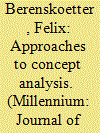

|
|
|
|
|
| Summary/Abstract |
This article takes as its point of departure Stefano Guzzini’s recent call for ‘ontological theorizing’ as a reflexive engagement with central concepts. In an attempt to advance this agenda, the article presents an accessible overview of different approaches to concept analysis to stake out the field for a discussion of what ontological theorising might entail. The article advances the notion of concepts as ‘basic’ and lays out the parameters through which they obtain meaning, followed by a discussion of three approaches, which tackle the multifaceted nature of basic concepts within and across different contexts. These approaches are labelled ‘historical’, ‘scientific’ and ‘political(critical)’ and presented through the work of Reinhart Koselleck, Giovanni Sartori and Michel Foucault, respectively. The article notes that concept analysis, as discussed here, stands in tension with modern forms of theory building yet is a creative source for theorising that accepts the unstable, political and context-bound nature of ontology.
|
|
|
|
|
|
|
|
|
|
|
|
|
|
|
|
| 2 |
ID:
175172
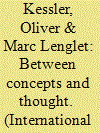

|
|
|
|
|
| Summary/Abstract |
This article advances the argument that the acceleration of practices introduced by digital technologies also impact key concepts of social theory. Digital technologies not only give rise to new concepts, but they also reconfigure our entire socio-political conceptual vocabulary. In particular, this acceleration reorganises the relationship between the spatial and temporal dimensions of political concepts. As a consequence, our spatially defined understanding of authority, hierarchy or relation underestimates the repercussions of shifting temporalities. This article pursues this shift from space to time and outlines how temporal relationality is gradually impacting the representations and images we live by.
|
|
|
|
|
|
|
|
|
|
|
|
|
|
|
|
| 3 |
ID:
111558


|
|
|
|
|
| Publication |
2011.
|
| Summary/Abstract |
Global governance involves worldwide redistribution of power, wealth and resources. The sole super power and other powers are focusing on the struggle between unipolarity and multipolarity. Traditional powers and emerging powers are competing against each other for power and interests. And there are ongoing conflicts among western countries and fragmentation in the developing world. China-U.S. relationship is particularly complicated, multi-faceted and ever changing. But different from its relations with the U.S., China has no direct geopolitical conflict of interests or outstanding issues left over from history in its relations with Europe. China and Europe now share increasing interests in addressing major international issues, and pursue the same or similar goals and concepts in upholding world peace and stability, in seeking to resolve international disputes through peaceful means and in reforming the international financial system. This has created broad space for China-Europe cooperation in global governance.
|
|
|
|
|
|
|
|
|
|
|
|
|
|
|
|
| 4 |
ID:
193485
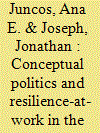

|
|
|
|
|
| Summary/Abstract |
International crises, most recently the Covid-19 pandemic and Russia’s invasion of Ukraine, often radically change our view of the world and our place within it. The European Union (EU) has been particularly impacted by these developments because these crises have accentuated some of its ontological and epistemological uncertainties and insecurities. While the EU’s resilience turn initiated by the EU Global Strategy of 2016 aimed at strengthening the EU’s ability to prepare and recover from external shocks and crises, since then, the concept of resilience has undergone a transformation. In recent years, we have seen the EU turning back in on itself and abandoning the radical aspects of resilience. Hence a paradox has emerged – the more complex the problems faced by the EU, the more it turns away from the logics of complexity present in the idea of resilience. In this article, we examine this conceptual shift through the lenses of concepts in action and the way these have reflected changes in the external context, but also power coalitions and institutional path dependencies. This argument will be explored by examining the recently adopted Strategic Compass and the EU’s Recovery and Resilience Facility (RRF).
|
|
|
|
|
|
|
|
|
|
|
|
|
|
|
|
| 5 |
ID:
086754
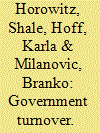

|
|
|
|
|
| Publication |
2009.
|
| Summary/Abstract |
While government turnover is often thought of as an adverse source of instability, it may also be viewed as a favourable source of competition and institution-building. To articulate and test such hypotheses, this article describes two main concepts of government turnover: leadership turnover, or change in rulers, and ideological turnover, or change in the rulers' ideology. Refinements involve the mode, outcome and timing of turnover. The article discusses measurement issues that arise when there are multiple power institutions and when parliaments are controlled by changing majority coalitions. The measures of turnover are illustrated by examining the post-communist world. The article considers the possibility that higher cumulative post-transition turnover - in terms of leaderships or ideologies - has assisted in establishing the rule of law.
|
|
|
|
|
|
|
|
|
|
|
|
|
|
|
|
| 6 |
ID:
161744


|
|
|
|
|
| Summary/Abstract |
It is difficult to overstate the importance of the concept sovereignty for international relations (IR). And yet, understanding the historical emergence of sovereignty in international relations has long been curtailed by the all-encompassing myth of the Peace of Westphalia. While criticism of this myth has opened space for further historical inquiry in recent years, it has also raised important questions of historical interpretation and methodology relevant to IR, as applying our current conceptual framework to distant historical cases is far from unproblematic. Central among these questions is the when, what, and how of sovereignty: from when can we use “sovereignty” to analyze international politics and for which polities? Can sovereignty be used when the actors themselves did not have recourse to the terminology? And what about polities that do not have recourse to the term at all? What are the theoretical implications of applying the concept of sovereignty to early polities? From different theoretical and methodological perspectives, the contributions in this forum shed light on these questions of sovereignty and how to treat the concept analytically when applied to a period or place when/where the term did not exist as such. In doing so, this forum makes the case for a sensitivity to the historical dimension of our arguments about sovereignty—and, by extension, international relations past and present—as this holds the key to the types of claims we can make about the polities of the world and their relations.
|
|
|
|
|
|
|
|
|
|
|
|
|
|
|
|
| 7 |
ID:
087998


|
|
|
|
|
| Publication |
2009.
|
| Summary/Abstract |
This paper details one attempt to construct an introductory course in international relations and comparative politics that does not rely upon one of the many textbooks in the field. This course description seeks to introduce students to global issues without reproducing and reifying a particular way of being in the world. It achieves this curatorial effect by exploring 11 concepts in the context of 11 books. There are both significant advantages and disadvantages to this approach. While the course is a lot more work for everyone, risks privileging breadth over depth, the results of this pedagogical method are opinioned to be remarkable and rewarding for both the student and the professor.
|
|
|
|
|
|
|
|
|
|
|
|
|
|
|
|
| 8 |
ID:
142188
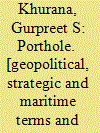

|
|
|
|
|
| Publication |
New Delhi, Pentagon Press, 2016.
|
| Description |
xxiii, 220p.hbk
|
| Standard Number |
9788182748637
|
|
|
|
|
|
|
|
|
|
|
|
Copies: C:1/I:0,R:0,Q:0
Circulation
| Accession# | Call# | Current Location | Status | Policy | Location |
| 058401 | 359.0954/KHU 058401 | Main | On Shelf | General | |
|
|
|
|
| 9 |
ID:
138768


|
|
|
|
|
| Summary/Abstract |
This study reconstructs the concept of interstate rivalry in accordance with a min–max strategy in order to determine the necessary characteristics of rivalry, provide a template with which to assess existing conceptualizations, and provide a means by which conceptualizations of rivalry can be formulated and operationalized. I argue that there are two necessary characteristics of a minimal conceptualization of interstate rivalry — temporal dependence and issue competition. Contextual conceptualizations are then formulated by adding dimensions, such as militarization, identification, and psychological hostility, among others, to the minimal definition. By defining interstate rivalry in its most extreme form (when all of the potential dimensions of rivalry are present in the fullest), I also establish a maximal or ‘ideal-type’ conceptualization. In adopting a min–max approach, this project seeks to unify conceptualizations of interstate rivalry along a common continuum in which the empirical coverage of cases decreases as properties are added to the minimal definition.
|
|
|
|
|
|
|
|
|
|
|
|
|
|
|
|
| 10 |
ID:
138782


|
|
|
|
|
| Summary/Abstract |
Researchers increasingly conduct quantitative studies of terrorist groups, which is an important advance in the literature. However, there has been little discussion of what constitutes a “terrorist group,” regarding conceptualization or measurement. Many studies of terrorist groups do not define the term, and among those that do, definitions vary considerably. The lack of clarity leads to conceptual confusion as well as sample selection issues, which can affect inferences. To address these issues, this article offers an in-depth analysis of the term and its use. It explores definitions in the literature, and then discusses different samples used. Empirically, the article demonstrates how sample selection can affect variable values. It also shows that a non-representative sample, such as the U.S. Foreign Terrorist Organization list, can lead to inaccurate generalizations. Ultimately, I present a straightforward “inclusive” definition, and argue for its practicality. Other suggestions are made for a more effective and cohesive research program.
|
|
|
|
|
|
|
|
|
|
|
|
|
|
|
|
|
|
|
|
|